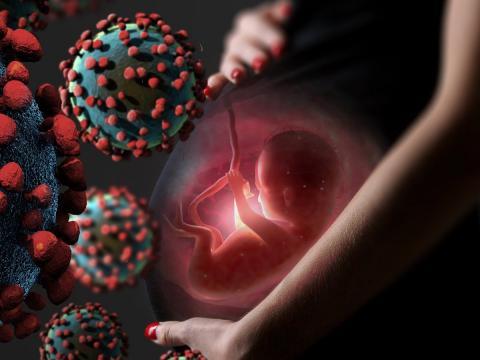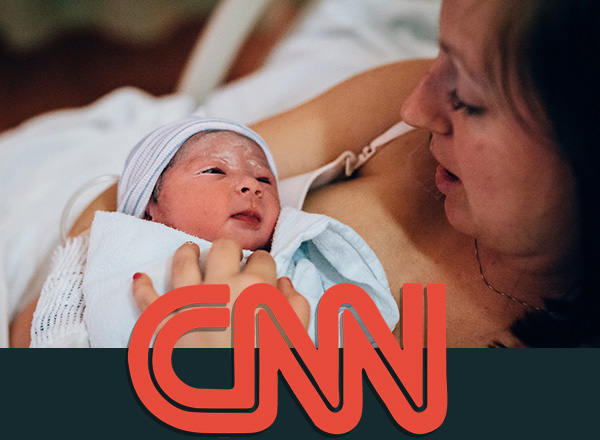What does a pregnant woman with coronavirus do?

What happens if I get infected with this virus while I’m pregnant?
With all the information we have so far, pregnant women do not have a higher risk of getting sick from the virus compared to the rest of the population, provided they do not suffer from serious chronic diseases. Moreover, coronavirus does not seem to pose a serious threat to the embryos.
However, we do know that pregnant women are more susceptible to common seasonal influenza and face more issues than the average population. Such issues may include premature labour or serious pneumonia, especially for women with existing chronic diseases. For this reason, a preventive influenza vaccination is recommended.
What can I do to protect myself, my baby and my family from the Covid-19 virus?
Follow the steps below on a daily basis in order to avoid the spreading of the virus and to protect your health:
Cover your nose and mouth with a tissue when you cough or sneeze. Throw this tissue away after it has been used. Wash your hands with soap and warm water, particularly after you cough or sneeze. Hand disinfecting products containing alcohol are preferable. Frequent washing of your hands will help to protect yourself from the virus. If you are already using any solutions that contain alcohol, do not add water and rub the solution until it dries up. Avoid rubbing your eyes, nose or mouth. Germs are transmitted this way.
Try to avoid any close contact with people who are ailing with influenza (if you do come in contact and you are pregnant, call your doctor).
What are the symptoms of the coronavirus infection?
Most symptoms are common with the ones of a seasonal influenza and they are as follows:
- Fever
- Cough
- Sore throat
- Body ache
- Shivers and fatigue
- Dyspnoea
- Loss of taste and/or smell
- Occasionally diarrhea and vomiting
Instructions for pregnant woman with coronavirus SARS-CoV-2
What should I do if I get sick?
If the virus exists in your immediate environment, make sure that you take care of your body, your diet, and that you keep a record of how you are feeling physically. If you have corona virus symptoms stay at home, avoid any contact with others and call your doctor. Your doctor will judge whether you need to be tested or if you are in need of therapy. If you have any further health issues they might get worse, as would be the case if you were to fall ill with the common seasonal flu.
If you live alone, notify someone who will check to see if the symptoms get worse.
Should you come in contact with someone who is infected from the virus, call your doctor to discuss if you need therapy so that it might reduce the risk of infection.
How is covid-19 infection treated?
Treat the fever immediately. Paracetamol (Depon, Panadol) is the best treatment for the fever. Consume a lot of liquids (such as water, juice) in order to replenish the liquids you lose while you are sick.
Your doctor will decide if you need special treatment. Antiviral medication are in the form of pills, syrups or inhalers and they block any further microorganism growth in your body. These medicines can help to make you feel better faster. They work best if treatment is started soon (within 2 days) but can also be used after the first 2 days. Treatment usually lasts 5 days.
There is little information regarding the effect of antiviral medication in pregnant women and embryos but no serious side effects have been reported If you think you may be having any side effects after taking antiviral pills, contact your doctor.
Remember that research into new effective coronavirus medication is still ongoing and will soon be available to all of us, such as monoclonal antibodies therapy or the MK-4482/EIDD-280 antiviral drug (known as Molnupiravir) which according to the research by the Institute for Biomedical Sciences of Georgia State University in the US (read more), is capable of fully suppressing the virus contagion within 24 hours.
When must I request immediate medical assistance?
Seek immediate medical assistance if you have any of the following symptoms:
- Difficulty in breathing
- Pain or pressure on the chest or the abdomen
- Sudden dizziness
- Difficulty concentrating and understanding
- Hyperemesis (frequent vomiting)
- Reduced or no movement of the embryo
- High fever which cannot be controlled by paracetamol (Depon, Panadol)
Can I breastfeed my baby if I am sick with coronavirus?
Breast milk is capable of fighting newborn diseases by nature. This is very important for newborns whose immune system is still in the development stage. You should not stop breastfeeding if you are sick. It is preferable to frequently breastfeed your baby and to avoid any commercial milk products. This will protect your baby from the influenza. Do not cough or sneeze on or towards the baby’s face. Wash your hands frequently with warm water and soap. The use of a mask when breastfeeding is highly recommended. You can also pump the milk and have another member of your family take care of feeding the baby.
Your doctor might require the use of mask to avoid the spread of the virus to your baby. If you are too ill to breastfeed, you can use a breast pump to pump milk.
Can I receive treatment for coronavirus while breastfeeding?
Yes. Mothers that breastfeed may continue their corona virus treatment.
Read more:

